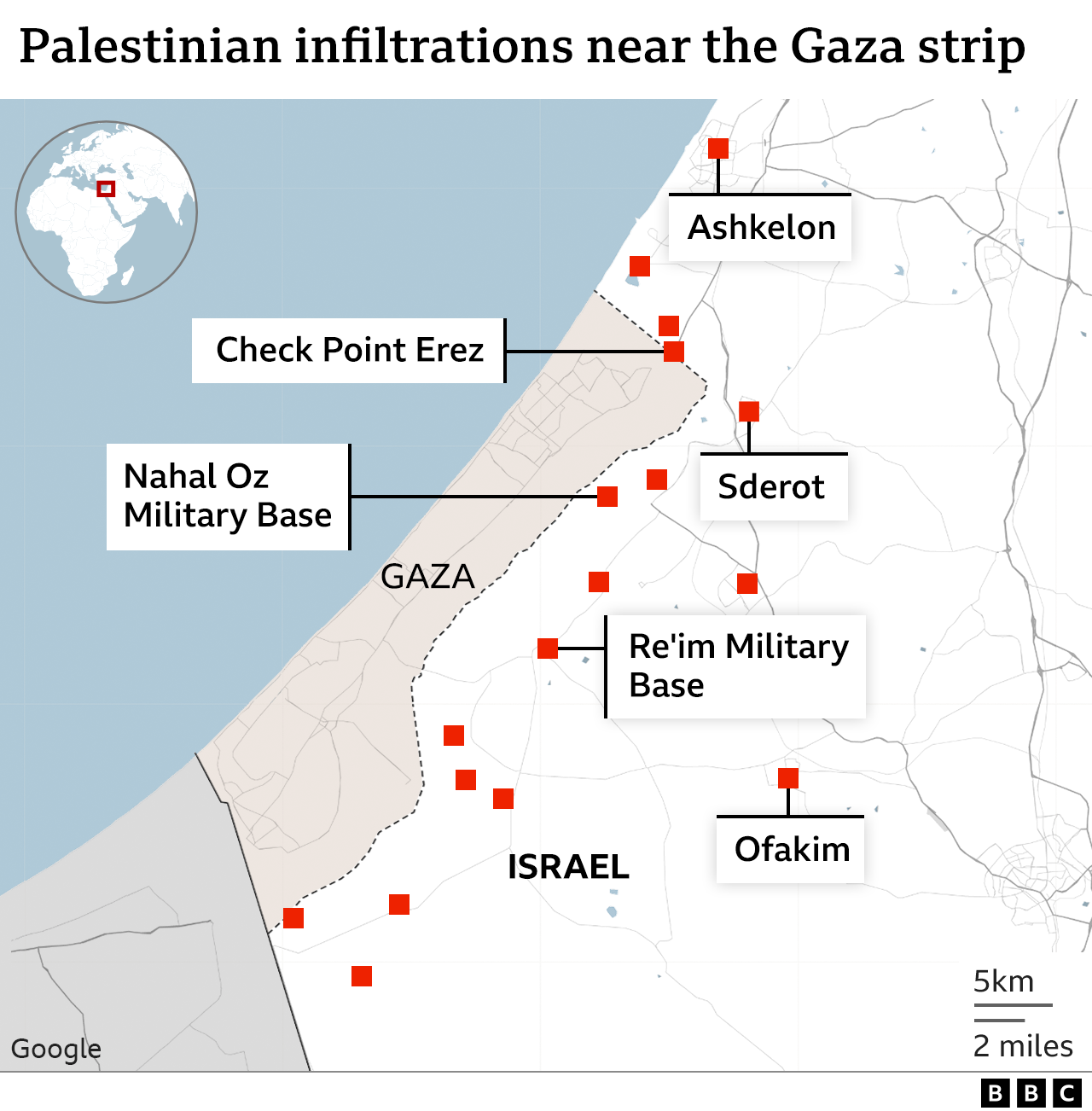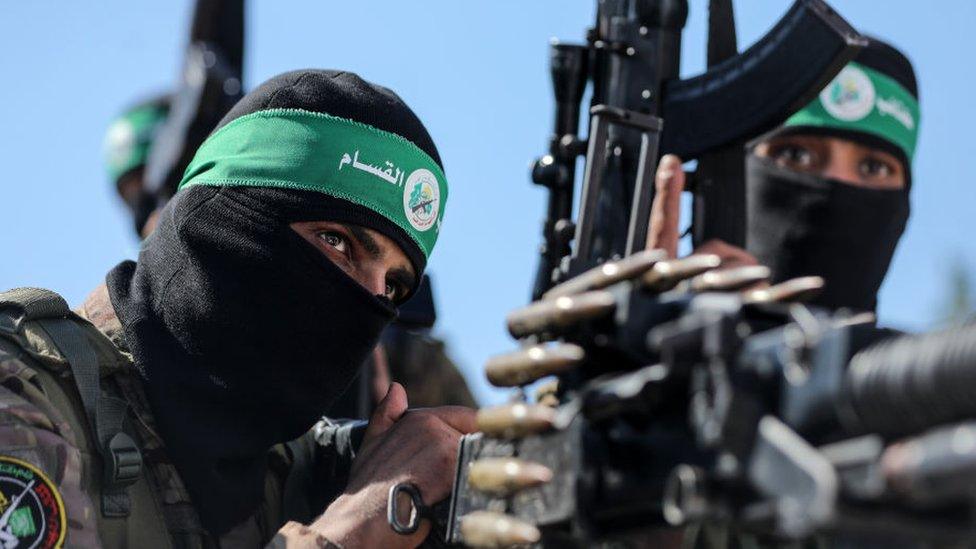Israel faces 'long, difficult war' after Hamas attack from Gaza
- Published
Watch: A day of violence and fear
Israel's military has warned that Hamas militants from Gaza are still fighting inside Israel after they infiltrated southern communities and left a reported 300 people dead.
Prime Minister Benjamin Netanyahu has told Israelis they are going into a "long and difficult war".
Hundreds of gunmen burst into southern Israel, killing soldiers and civilians, and taking into Gaza what the army said was a "significant number" of hostages.
Israel has responded with air strikes.
These have continued on Sunday morning, with the Israeli Air Force saying it was targeting "operational infrastructure" in Gaza.
The Israeli military also carried out artillery strikes in southern Lebanon after mortars were fired from there towards Israeli positions in the disputed Mount Dov/Shebaa Farms area.
Lebanon's militant Hezbollah movement claimed it had carried out the attack "in solidarity with the Palestinian resistance".
More than 300 people have been killed by Israeli strikes in Gaza since Palestinian militants infiltrated Israel from Gaza on Saturday morning, according to Palestinian health officials.
Gazans received Israeli text messages overnight telling them to leave their homes and move to city centres or take refuge in shelters.
The Israeli prime minister said in an overnight message that the war had been "forced on us by a murderous attack by Hamas", and the first stage would end in the coming hours when most of the militants on Israeli territory had been wiped out. Israel would restore security to its citizens and win, he added.
The Israeli government also said it would cut off electricity, fuel and goods supplies to Gaza.
Israel's nightmare scenario - armed Palestinian militants at large in the south of the country - began early on Saturday, the Jewish Sabbath and festival of Simchat Torah.
Gunmen cut through the Gaza perimeter fence, storming into Israel on motorbikes, paragliders and by sea. The Israel Defence Forces (IDF) spokesman said they numbered in the high hundreds, while more than 3,000 rockets were fired across Israel across the day.
"They attacked dozens of Israeli communities and IDF bases and went door to door, house to house," said Lt Col Jonathan Conricus.
"They executed Israeli civilians in cold blood in their homes and then continued to drag into Gaza Israeli civilians and military personnel. I'm talking women, children, elderly, disabled."
Distressing videos emerged of Israeli civilians running for their lives from a festival in the desert, and of women being bundled into vehicles and kidnapped.
Watch: Party-goers recall militant attack
Israelis rang into news channels saying they were hiding in their homes and scared for their lives. The town of Netiv HaAsara said 15 of its residents were shot dead by Hamas militants.
In the town of Sderot, a resident called Shlomi described seeing a "sea of bodies, inside Sderot along the road".

More on Israel-Gaza attacks
Follow LIVE: Latest updates
Analysis: Israel blindsided, says Jeremy Bowen

Gradually the Israeli military began to reassert control over most of the southern communities. Hostages held in a dining room in Kibbutz Be'eri were eventually freed after 18 hours, Israeli media reported. Shortly afterwards further reports said troops had freed hostages in the town of Ofakim and the attackers holding them had been killed.
US President Joe Biden spoke of America's "rock-solid and unwavering" support for Israel which was "under attack orchestrated by a terrorist organisation".
Hamas's military wing said the number of Israelis captured was several times greater than dozens and they included senior military officers.
By the end of Saturday, more than 1,500 people had been wounded in Gaza and 1,500 more in Israel, officials said.
The army said Hamas's unprecedented level of violence would be met with an unprecedented response.
Tens of thousands of reservists have been mobilised and are now expected to launch a ground operation in Gaza.

On Saturday Israeli strikes destroyed the 11-storey Palestine Tower in downtown Gaza City, which houses Hamas radio stations in the rooftop.
The Israeli air force said it struck "military infrastructure in two multi-storey buildings used by senior Hamas terrorist operatives for carrying out terrorist activity", and that it had warned occupants to evacuate before the attack.
There was also violence in several locations in the West Bank on Saturday. Palestinian medics reported that six Palestinians were shot dead during confrontations with Israeli forces.
Hamas military commander Mohammed Deif called on Palestinians everywhere to join the group's operation.
"We have decided to put an end to these Israeli offences with God's help, so the enemy understands that the time of wreaking havoc without being held accountable is over," he said.
Ismail Haniyeh, the leader-in-exile of Hamas, claimed that Palestinian factions intended to expand the violence to the occupied West Bank and Jerusalem.
Ghazi Hamad, a Hamas spokesman, meanwhile told the BBC that the group had direct backing for the attack from Iran.
Palestinian President Mahmoud Abbas - a political rival of Hamas - said the Palestinian people had the right to defend themselves against the "terror of settlers and occupation troops".
There has been strong international condemnation of the Hamas attacks.
UN Secretary General António Guterres said he was "appalled by reports that civilians have been attacked and abducted from their own homes", while the UK's Foreign Secretary, James Cleverly, said it "unequivocally condemns the horrific attacks by Hamas on Israeli civilians".
However Saudi Arabia called for an immediate halt to the escalation, saying it had warned repeatedly about the dangers stemming from "continued occupation" and "the deprivation of the Palestinian people of their legitimate rights".

Are you personally affected by the issues raised in this story? If it is safe to do so, you can get in touch by emailing haveyoursay@bbc.co.uk, external.
Please include a contact number if you are willing to speak to a BBC journalist. You can also get in touch in the following ways:
WhatsApp: +44 7756 165803
Tweet: @BBC_HaveYourSay, external
Please read our terms & conditions and privacy policy
If you are reading this page and can't see the form you will need to visit the mobile version of the BBC website to submit your question or comment or you can email us at HaveYourSay@bbc.co.uk, external. Please include your name, age and location with any submission.
